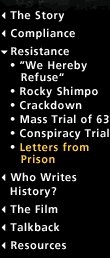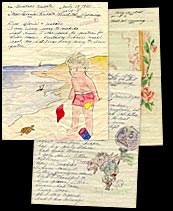| |

Broadcast
Schedule
|
 |

 |
From prison, Guntaro Kubota and others sent letters back to camp to keep their families' spirits up. Kubota's English was not good, so from his prison cell at Leavenworth, he drew cartoons and sent them to his wife Gloria and their two children, 4-year old Grace (Makiko) and 1-year old Gordon (Hidemaro).
|
|
Documents, Photographs and Video |
 Get RealPlayer Get RealPlayer |
 |
Letter (May 19, 1945)
Kubota's newborn son, Gordon, was born inside the camp only days before his arrest in July, 1944.
Kubota named his son after the curfew violator from Seattle, Gordon Hirabayashi.
This letter is written just before Kubota's daughter's 4th birthday on May 22nd.
|
 front
front |
|
|
|
 |
Letter with cartoon (June 29, 1945)
Grace Kubota Ybarra's favorite of the cartoons sent by her father.
|
 front
front |
|
|
|
 |
Letter with cartoon (July 15, 1945)
Letter with a cartoon of his young son Gordon, who had just turned one year old on July 8th.
This is the letter read by Kubota's daughter in the documentary.
|
 front
front |
 back
back |
|
|
 |
Letter written after Halloween (November 5, 1945)
By this time the government had closed Heart Mountain, and Gloria Kubota has moved their
family into a Wyoming boarding house run by a Mr. Adachi, a Laramie businessman living outside
the west coast exclusion zone who took an interest in the resisters cause.
|
 front
front |
 back
back |
|
|
 |
Letter (November 8, 1945)
Kubota shares a dream in which he meets his daughter whom he hasn't seen in about one year.
|
 front
front |
|
|
|
 |
Letter (November 12, 1945)
Front: When Kubota says of his children, "I hope see them very soon," he is anticipating
a favorable outcome on the Fair Play Committee's appeal. On December 26th, the Tenth Circuit Court of
Appeals will reverse their convictions.
Back: Cartoons. The face is that of Guntaro Kubota, as sketched by his cell mate, Frank Emi.
|
 front
front |
 back
back |
|
|
 |
FRANK EMI (1 min)
The resisters impressed other inmates with an exhibition of judo.
|
|
 transcript
transcript |
 video: 56k | DSL
video: 56k | DSL |
|
|
|



